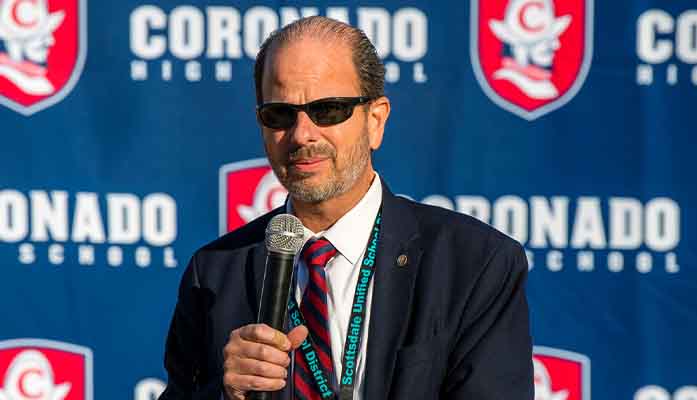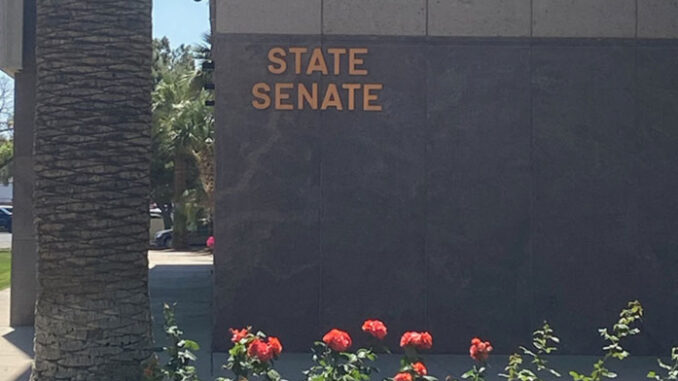
by Tiffany Benson | Aug 1, 2025 | Opinion
By Tiffany Benson |
K-12 superintendents are the CEOs of public schools, spearheading a cabinet of professionals who manage district resources and implement safety and academic programs. Superintendent qualifications may include a doctorate of philosophy (Ph.D.) or education (Ed.D.) and some experience in finance, communications, and organizational leadership.
Superintendents are paid exorbitant salaries topping close to $1 million, depending on the district size. This amount does not include performance bonuses, work vehicles, mobile devices, or lavish vacation packages—er, I mean, “out-of-state professional development conferences.” Whether superintendents do good or evil, employment agreements stipulate that they receive full compensation and benefits, largely at the taxpayers’ expense.
Arizona public schools are home to some of the most ethically challenged and morally questionable high-level administrators. K-12 superintendents across the Valley primarily care about aesthetics and the “business of the district.” Below is an incomplete list of superintendents with controversial reputations, alongside the elected officials who bow to their almighty paper-pushing agenda.
Newly hired Higley USD Superintendent David Loutzenheiser now sits on the dais with governing board members, leaving his cabinet on the floor. This arrangement was approved by the purple-haired board president, Amanda Wade, who once advocated for striking the word “immoral” from teacher-student communication policies. Radical board member Tiffany Schultz—who once declared that professional dress codes “sexualize children’s bodies”—backed Wade’s decision to disrupt the chain of command. No one but Loutzenheiser benefited from this stunt. He set a bad precedent for what’s to come. Read more in AZ Free News.
Earlier this year, a resident in the Cartwright Elementary School District sued two board members for nepotism, citing A.R.S. 15-421. Cassandra Hernandez (elected at age 19) is the daughter of board president and state representative Lydia Hernandez (D). Despite using different addresses on their campaign applications, constituents cried foul and called for their resignations. The Hernandezes led a charge to install the disgraced former Maricopa County Superintendent Steve Watson as district superintendent. Watson is accused of fraud and leaving behind an infestation of financial deficits, lawsuits, and dysfunction in the county office. Cartwright residents have no reason to expect Watson will leave their district any better than he found it.
Deer Valley USD residents constantly complain across social media about Superintendent Curtis Finch’s dismissive “leadership” style. Residents are also suspicious of Finch’s camaraderie with board president Paul Carver, who once told a room full of conservatives that Finch is the best superintendent in the state. Both men support a twice-failed ballot measure that would allow the district to exceed its budget. Finch defended the 15% override, stating: “The anti-public school movement is growing here in Arizona, which is a crime against humanity.” Whether or not good things are happening in DVUSD is up for interpretation, but declining enrollment numbers are the telltale sign of a district in freefall. Go Parents!
No list of sketchy superintendents is complete without Scottsdale USD’s Scott Menzel. He is a freak show in his own right, accounting for the majority of the district’s media exposure. Menzel is widely known for shaming white people who don’t feel guilty about their skin color. Before vacating their seats, debased board members Zach Lindsay, Libby Hart-Wells, and Julie Cienawski extended Menzel’s contract through 2025. Under his “leadership,” SUSD chartered more student-led sexuality clubs, adopted an anti-police curriculum, and circulated hundreds of pornographic books in school libraries. As a result, in 2024, the Arizona School Administrators organization proudly named Menzel the National Superintendent of the Year (this title must be reserved for clowns).
Peoria USD has a slightly better handle on its administration problem since board president Heather Rooks removed Superintendent K.C. Somers from the dais. This establishes a clear separation of employer and employee while respecting the expertise each brings to the district. Unfortunately, though, Somers is developing a reputation for operating in subtle forms of manipulation and subversion, as if he’s trying to sabotage the board members he can’t control. I once attended a meeting where Somers yowled at board members when they ripped off the COVID-19 funding band-aid. Interestingly, before coming to Arizona, Somers was the superintendent of a Colorado school district steeped in scandal and cover-up. He would do well to note that PUSD residents won’t sit for that.
(Dis)honorable Mentions: Tolleson Union HS Superintendent Jeremy Calles morally and financially bankrupted his district. Former Mesa Public Schools Supt. Andi Fourlis oversaw an untold number of social gender transitions without parental knowledge. Tucson USD Supt. Gabriel Trujillo encouraged and attended a student-led drag show on campus, even after one teen was sexually abused by a high school counselor who organized the opening event. Chandler USD Supt. Frank Narducci declared a “week of kindness” and distributed 9-1-1 stickers after unchecked bullying led to one student’s murder and another student’s suicide. There’s more, but we’re out of time.
Those who can’t get elected apply for high-power jobs. Most K-12 superintendents have no campaign grit and no winning personality. Thus, they depend on compromised board members to execute their agenda. Superintendents don’t represent the whole community—they represent the educated community. They may be intellectual experts, but they don’t swear an oath to the U.S. Constitution, and they are not the final governing authority.
The board of education—elected officials who report to taxpayers (that’s you!)—hires the superintendent, and they ultimately decide what to approve or reject. No one is demanding perfection. Arizona families simply want integrity, transparency, and common sense. K-12 community members who experience dissatisfaction with bloated, overcompensated administrative teams should call, email, request meetings, alert the media, and speak at school board meetings. When superintendents refuse to operate within the scope and ability of their job description, expose them.
Tiffany Benson is the Founder of Restore Parental Rights in Education. Her commentaries on education, politics, and Christian faith can be viewed at Parentspayattention.com and Bigviewsmallwindow.com. Follow on Facebook @TiffanyBenson and Instagram.

by Jonathan Eberle | Aug 1, 2025 | News
By Jonathan Eberle |
A new Arizona law banning the use of privately funded employees in state agencies is drawing national attention as lawmakers seek to curb outside influence in public institutions.
Signed into law last month under Senate Bill 1735, the new law prohibits any state agency from employing officers or staff whose salaries are paid with private funds. The legislation aims to increase transparency and reduce what supporters call “lawfare for hire” — the practice of embedding privately paid attorneys or staff within government offices to influence public policy.
“This is about drawing a clear line between public service and private influence,” said Senate President Warren Petersen. “Arizona will not tolerate lawfare for hire, where outside billionaires fund shadow attorneys to quietly steer public policy behind closed doors.”
The law defines “private monies” as any funding not appropriated by a federal, state, or local government — including funds from nonprofit organizations, foundations, universities, individual donors, or advocacy groups. Limited exceptions are made for law enforcement, environmental quality staff, and public universities, where oversight frameworks are already in place.
The law comes amid broader national scrutiny of efforts such as the NYU Environmental Fellowship, which places attorneys funded by Bloomberg Philanthropies in state attorneys general offices to work on climate-related litigation. Critics argue these “Special Assistant Attorneys General” blur the lines between public and private interests, especially when pursuing legal strategies aligned with specific political ideologies.
Supporters of the new Arizona law say the measure enhances legislative oversight and keeps public servants accountable to the taxpayers who fund their salaries — not to out-of-state advocacy groups or wealthy individuals.
“Taxpayers deserve to know who’s working on their behalf, and who’s really pulling the strings,” Petersen said.
States like New York, Washington, and Illinois have welcomed privately funded legal fellows into public agencies, particularly in areas related to environmental enforcement. But Arizona’s move places it among a smaller group of states seeking to restrict such arrangements in the name of governmental independence.
Jonathan Eberle is a reporter for AZ Free News. You can send him news tips using this link.

by Matthew Holloway | Aug 1, 2025 | Education, News
By Matthew Holloway |
Arizona Superintendent of Public Instruction Tom Horne followed the U.S. Department of Education’s release of its pause on grant funding with a public commitment to disburse the funding as soon as possible.
The Arizona Department of Education announced that $124 million, or approximately one percent of the state’s overall education funding, was under review by the federal government.
The funding was due to be released in early July, but the approximate $6 billion in nationwide funding, including the $124 million allocated for Arizona, was placed under review by the agency on July 1st.
“The department will not be issuing grant award notifications obligating funds for these programs on July 1 prior to completing that review,” a memo from the Department’s Office of Legislation and Congressional Affairs said at the time. “The department remains committed to ensuring taxpayer resources are spent in accordance with the president’s priorities and the department’s statutory responsibilities.”
In an interview with the outlet, Secretary of Education Linda McMahon assured the public, “We want to make sure that we have the right focus on what we’re trying to do with our students.”
Superintendent Horne said in a statement, “The release of federal funds that were being reviewed by the Trump administration is good news and no surprise to me. When the review was announced I noted that the federal government is merely ensuring that the funds are being used appropriately and not for ideological purposes. People need to be assured that their education tax dollars are being used to advance academic goals and not social indoctrination.”
He added, “When the pause occurred, a lot of people panicked thinking the money would go away entirely. I said at the time that this was merely a pause for review and that is exactly what happened. The Arizona Department of Education staff will work very hard to disburse these funds as soon as possible.”
Horne shared a video clip on Friday from President Trump, coinciding with the release in which the President said, “We are moving education back to the states….when they do it, you are going to have the BEST education in the world.”
In a previous statement, Horne observed, “They’ve (federal government) seen instances of far-left ideology being taught to students. And I would agree that that should not be. People obviously have a right to be far left if they want, but they don’t have a right to impose it on students in the classroom. So, if there’s any of that in Arizona, I would cooperate enthusiastically with the federal government to get rid of it.”
Matthew Holloway is a senior reporter for AZ Free News. Follow him on X for his latest stories, or email tips to Matthew@azfreenews.com.

by Matthew Holloway | Jul 31, 2025 | Education, News
By Matthew Holloway |
In the aftermath of the controversial whistleblower audio released in May, the Catalina Foothills School District (CFSD) has responded by banning students from recording “a classroom teacher or administrator” without permission, according to Save CFSD.
The audio released in May included an alleged teacher criticizing the religious texts of Christianity, Islam, and Judaism on LGBTQ issues in a 9th grade health classroom.
In addition to the new prohibitions, Dan Grossenbach, a CFSD parent, resident, and contributor to Save CFSD, shared an email with AZ Free News from the district indicating that the teacher involved has faced zero disciplinary action.
In his email, Grossenbach explained, “In public statements, CFSD administration implied to State48 and the AZ Daily Star editorial page that they fired the teacher, but the district has confirmed to me by email that there was no discipline.”
According to Grossenbach, the board launched its efforts to prevent students from creating any further classroom recordings in an unscheduled meeting on Tuesday.
“They held an unplanned/emergency meeting on Tuesday to pass a policy they claimed was based on a new law banning cell phones,” Grossenbach said. “However, they added a line about banning classroom recordings, electronic recorders, or posting any audio publicly. They added that teachers have the right to search and seize all personal items and threatened student expulsion.”
Grossenbach further said that the district has not made its sex-education curriculum publicly available as required under Arizona Revised Statutes § 15-711.
Save CFSD shared a lengthy thread to X, outlining the new policies enacted by the district.
According to screenshots provided by the group, the district made two major changes to its existing policies:
1. Restricting student access to social media platforms except as allowed by the student’s teacher for educational purposes; and
2. Limiting the use of wireless communication devices by students during the school day, exceptions include allowing student use of wireless communication devices for medical needs, educational purposes as directed by the student’s teacher, or during an emergency.
However, included in these policies are a few key points. The use of a “PD” or personal electronic device, including, but not limited to “cellular telephones, digital audio players, digital cameras, laptop computers, tablet computers, pagers, portable game players, smartwatches, smart glasses, and any new technology developed with similar capabilities,” now falls under the district’s policy for “Electronic Information Services” and under those terms:
“Each user of the District’s EIS, including a user of a PD shall:
- Obtain permission to record, transmit, or post photos or a video of a person with any electronic device.
- Obtain permission from a classroom teacher or administrator before making publicly available any images, video, or audio files recorded at school.”
Essentially, the new policy presents a de facto ban on any student recording a teacher or administrator without their permission, rendering future whistleblowing impossible without risking potential expulsion. Finally, the policy empowers school officials to “search and/or seize student property, if there are reasonable grounds that the search and seizure will reveal evidence that the student has violated or is violating the law or a District Policy procedure or school rule.”
The policy also states explicitly: “This authority extends to student-owned electronic/technology devices and electronic storage.”
Matthew Holloway is a senior reporter for AZ Free News. Follow him on X for his latest stories, or email tips to Matthew@azfreenews.com.

by Jonathan Eberle | Jul 31, 2025 | News
By Jonathan Eberle |
Arizona Senate President Warren Petersen announced a series of key leadership changes Monday, reshuffling committee chairmanships as the Legislature continues to press forward with its conservative agenda.
Senator John Kavanagh will step down as Chairman of the influential Senate Appropriations Committee to focus full-time on his new position as Senate Majority Leader. Replacing him is Senator David Farnsworth, who will now lead the newly combined Appropriations & Transportation Committee.
Farnsworth, a longtime advocate of limited government and responsible budgeting, is expected to bring a fiscally conservative approach to the role. His leadership will influence critical decisions on state spending, infrastructure investment, and resource allocation.
In turn, Senator Hildy Angius will take over Farnsworth’s previous post as Chair of the Senate Education Committee. Angius will helm legislative efforts concerning Arizona’s K-12 and higher education systems, with a particular focus on school choice and parental rights—issues that remain a top priority for Senate Republicans.
“These appointments strengthen our chairmanship bench and keep our conservative agenda focused where it belongs – on the needs of everyday hardworking Arizonans,” said President Petersen in a statement. “I’m confident these committees will continue to be led with integrity, discipline, and common sense.”
The realignment signals a tightening of Senate leadership around core priorities such as budget discipline, infrastructure modernization, and education reform, as lawmakers gear up for the next legislative session.
Jonathan Eberle is a reporter for AZ Free News. You can send him news tips using this link.





